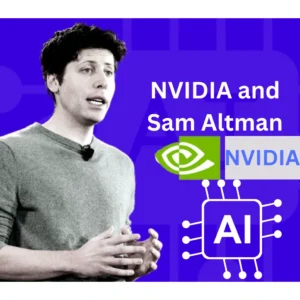Introduction to NVIDIA and Sam Altman’s $1 Trillion AI Revolution
The term “artificial intelligence” (AI) has become increasingly prominent in recent years as one of the most transformative forces that are influencing our global economy and culture. In this blog, we investigate the key role that NVIDIA Corporation and its CEO, Sam Altman, have played in propelling the artificial intelligence revolution towards a market opportunity that is estimated to be worth one trillion dollars.
We are going to go into their contributions, investigate new trends, and talk about the ramifications of this monumental transformation.
NVIDIA’s Impact on AI
NVIDIA was an early innovator in the field of graphics processing units (GPUs) when it was established in 1993. Over time, they have broadened their scope of operations to include not only the gaming industry but also data centres, the automobile industry, healthcare, and other sectors where processing power is the driving force behind innovation.
Their CUDA technology, which enables parallel computing across GPUs, has been an essential component in the acceleration of research and development in the field of deep learning.
Some of the most illustrious IT companies in the world, such as Google, Amazon Web Services, Microsoft Azure, and Alibaba Cloud, have embraced the GPU-based solutions provided by NVIDIA.
Through the formation of these partnerships, the deployment of large-scale artificial intelligence systems has been made easier, which has led to advancements in areas such as natural language processing, computer vision, and reinforcement learning.
NVIDIA and Sam Altman: An AI Visionary
In January 2023, Sam Altman was appointed to the position of Chief Executive Officer of NVIDIA. He brings a plethora of experience and skills to his new role. His previous positions include serving as President of Y Combinator, a well-known startup incubator, and cofounding OpenAI, a nonprofit organization whose mission is to advance artificial intelligence research and responsible application of AI technology. Prior to joining NVIDIA, he held these positions.
The objective of NVIDIA is to democratize artificial intelligence and make it accessible to all segments of society. Altman’s dedication to promoting a culture of cooperation and transparency within NVIDIA is ideally aligned with this mission.
He is of the opinion that artificial intelligence (AI) has a great deal of promise for resolving difficult issues and making people’s lives better, but he is also aware of the fact that there is a need for serious examination of the ethical concerns that are linked with advanced AI systems.
The Trillion Dollar AI Market
There are enormous chances for growth in a variety of industries, including manufacturing, banking, transportation, and healthcare, according to the McKinsey Global Institute. The artificial intelligence business has the potential to create new income of up to thirteen trillion dollars worldwide by the year 2030.
Considering that NVIDIA is continuing to make significant investments in research and development and is expanding its product range, the business is in a position to seize a sizeable piece of this rapidly growing industry.
On the other hand, in order to fully realize the potential of artificial intelligence, it is necessary to address crucial issues with privacy, security, job displacement, and justice. For the purpose of ensuring that artificial intelligence (AI) is beneficial to humanity while also limiting any threats, NVIDIA and Sam Altman intend to work closely together with legislators, academia, and industry leaders.

Future Trends in AI
As we look ahead, several exciting developments are set to shape the trajectory of AI over the coming decade. Some notable trends include:
- Quantum Computing: The combination of conventional computers and quantum processors has the potential to unleash previously unimaginable levels of processing speed and efficiency, which would result in an exponential increase in the capabilities of artificial intelligence.
- Generative AI: Advances in generative models will enable machines to produce original text, images, videos, and music, opening doors to creative possibilities previously thought unattainable.
- Edge AI: With the rise of IoT devices and edge computing, AI algorithms will increasingly operate at the device level rather than relying solely on centralized cloud servers.
- Explainability and Interpretability: Enabling humans to understand how AI decisions are made will foster trust and confidence in AI systems, ultimately promoting widespread adoption.
Conclusion
It would appear that the artificial intelligence landscape is well positioned for further expansion and transformation, thanks to the technological expertise of NVIDIA and the forward-thinking leadership of Sam Altman. However, despite the fact that there are still a vast number of obstacles to conquer, the potential benefits of utilizing AI for the betterment of society are too tremendous to ignore.
I would want to conclude by saying that let us take advantage of the countless opportunities that this new technology presents and collaborate with one another to create a better tomorrow.





